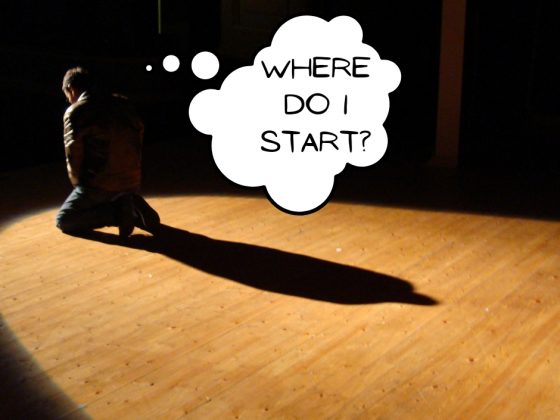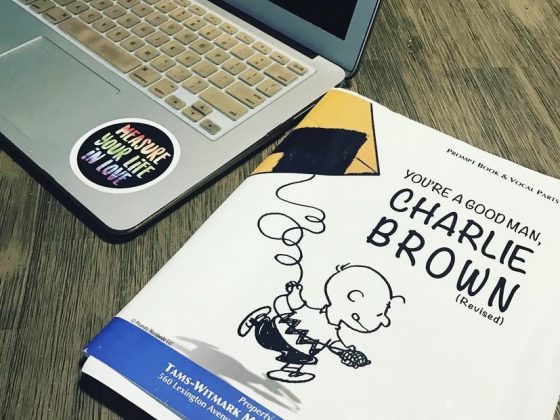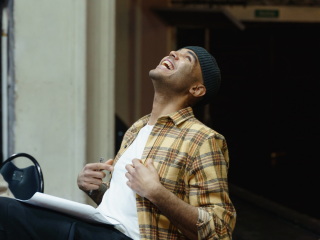It’s hard to be your best when you find yourself constantly worrying about how others perceive you. And yet, the entire craft of acting forces you to put yourself front and center, dependent on the response of others. In order to do your job effectively, you naturally leave yourself open for self-consciousness and doubt. So how as a working performer do you continue to do your job and maintain your mental health?

Shifting Focus
A good first step is trying a simple change of focus. For example, instead of walking into an audition room worried about what the auditors will think of you, instead try entering the room from a place of gratitude. Tell yourself how lucky you are to have the opportunity to audition for these people today and focus on the opportunity to share your gifts with them. Think of the audition more as a performance. Worry less about what the people behind the table are thinking about you, and instead focus on your enjoyment in performing for them. Of course, this is easier said than done. It’s easy to be your own worst enemy and it’s so easy to get into your head while performing. But learning to be present and enjoying the process of auditioning will make it such a better experience for you. When walking out of an audition you should make it your goal to be able to say, “Wow, I felt like I enjoyed myself in there today and I felt like I did a great job!” The rest is out of your hands anyway.
Performance Journal
A performance journal is a great tool to help you analyze any habits of self-sabotage. This can be used for auditions as well as performances. The goal is to make a notation after each event and note what you performed, what reactions you received, and how you felt. This is a good way to discover any triggers you may have so you can begin to find ways to combat them. For example, maybe you get self-conscious at auditions whenever you are asked if you brought any other material, or you begin to doubt yourself at a performance when the audience fails to laugh somewhere that they previously laughed. By identifying your triggers, you can help train yourself to avoid falling into the abyss.
It may help you to know that even seasoned professionals struggle with self-consciousness and doubt. Actor and writer Harvey Fierstein titled his recent memoir I Was Better Last Night after a frequent phrase he finds himself uttering after performances.
“I can’t count the times I’ve had friends visit after a performance only to hear myself say, ‘I was better last night’. Of course I was better last night. I was younger, fresher, braver, and had one less day of life clogging my brain.”
Harvey Fierstein, I Was Better Last Night: A Memoir (2022)
Meditation
Meditation is another helpful tool you can use to help combat self-consciousness and doubt. If you’ve never meditated or have had trouble building a practice, try starting with guided meditation. You can find free apps or search for “guided meditation” on YouTube to find videos such as this one.
Commit to doing a meditation before each audition or performance. The meditation can be as short as five minutes but if done consistently, this habit will help you focus and keep your mind from wandering to places you don’t want it to go. After using guided meditations for a while, you may want to create your own. For example, try seeing yourself walking out of the audition feeling great or finishing up a performance and hearing people applauding. Projecting this kind of mindset can help you to actually manifest it.
Social Media
Another important tool for combating self-consciousness and doubt is to limit your exposure to social media. Comparing yourself to others is a surefire way to make yourself feel undervalued. If you are struggling with self-consciousness and doubt and you are someone who checks social media multiple times a day, you may want to think about limiting your screen time. There are apps you can set to notify you after you’ve been online a certain amount of time. And you may want to try eliminating social media when it can trigger you most, for example, right before or after an audition, or right after a performance. Many doctors suggest not looking at your phone at all before bed. In an article entitled, “Why You Should Ditch Your Phone Before Bed,” sleep medicine expert Michelle Drerup suggests:
“Going to bed and falling asleep should be a peaceful, happy and relaxing experience. Engaging with your phone too close to bedtime can negatively impact those feelings. […] You probably know what it’s like to scroll through Facebook right before bed and see something that makes you upset. Unsurprisingly, stress and anxiety are often two major reasons for disrupted sleep.”
Learning to love and support yourself can be challenging. It will take time to train yourself away from self-sabotaging behaviors. But training your brain to focus on supporting you, instead of counterproductive behaviors, can only make your performances stronger. Learning to be present and grateful, and assessing your strengths and challenges objectively, will certainly make you a stronger and more grounded performer.














